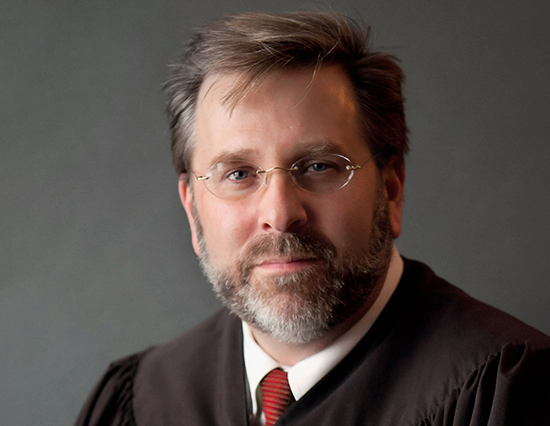
June 3, 2020 – Sometime when the pandemic eases and we can gather again, ask Bayfield County Circuit Court Judge John Anderson about the time he held court in a cranberry bog.
Or about the time he helped coach boys’ basketball during the state tournament at the Kohl Center in Madison.
It’s all part of the experience of being the judge in a single-branch county – and an involved member of the community.
Local and District Leader
Judge Anderson is the recipient of the Judge of the Year Award from the State Bar of Wisconsin Bench and Bar Committee. The award recognizes an outstanding circuit court judge who has improved the judicial system during the past year by his or her leadership in advancing the quality of justice, judicial education, or innovative programs.
The State Bar celebrates this award and others each year with the Member Recognition Celebration, held in June at the State Bar Annual Meeting & Conference. Due to COVID-19 and concerns for the safety of State Bar members, the celebration of our 2020 award recipients is held via video. Join in and see the ceremony on WisBar.org, including Judge Anderson's acceptance remarks.
Those who know him say that Judge Anderson actively seeks out innovation to improve the justice system. And he’s developed such a reputation as an impartial jurist that he was nominated for the award by both a prosecutor and a defender.
According to Bayfield County District Attorney Kimberly Lawton and State Public Defender William Appleton, “it is only fitting that opposing counsel, treated equally and fairly by Judge Anderson, nominate him for this award.”
They both agree that “Judge Anderson embodies the ideals we all hope for in a judge. His dedication is palpable, and his energizing community engagements bring community faith in his courtroom.”
Judge Anderson is a leader both in his community and in the district, says Judge Maureen Boyle, Barron County Circuit Court judge and chief judge of the 10th District, where Judge Anderson serves as deputy chief. With his leadership, the recidivism rate for offenders in Bayfield County is reduced. In addition, he took on additional cases to assist neighboring counties with their heavy caseloads. And, his service on statewide committees advances initiatives “key to the judicial branch remaining an efficient and effective part of the government.”
“Whether problem solver, administrator, or adjudicator, Judge Anderson exudes professional competence, integrity, and an even judicial temperament,” Judge Boyle says.
Hearing of his award was a “complete shock,” Judge Anderson said. “The reason things work so well here is that we have a lot of smart people doing good things.”
Judge John Anderson: Advice to New Judges
Here is some of the advice Judge Anderson would give to new judges:
-
You can be an excellent jurist, with a clear mind, make good decisions. But if you can’t administer your calendar, it can turn into a disaster.
-
To avoid letting problems overwhelm you, stay ahead of them.
-
Seek to find better solutions to problems.
-
The real boss of the courtroom is the court reporter.
-
Ask questions, and involve people.
Deep Roots in Bayfield
Judge Anderson’s family has lived in Washburn for generations – the last four generations operating a grocery store in the city.
Shannon Green is communications writer for the State Bar of Wisconsin, Madison. She can be reached by email or by phone at (608) 250-6135.
“My father worked very long hours, up to 75 hours per week,” he said. “That was the culture I grew up in – you work early morning to late at night. I still do that – it may not be the healthiest characteristic in the world, but it’s who I am.”
He knew law school was his path while in high school, and he was the first in his family to go to college. After graduating in 1989 from William Mitchell College of Law in St. Paul, Minnesota, he passed the Wisconsin bar exam and returned home, joining a small firm in Washburn. After 14 years of private practice, including serving as court commissioner 1996-2003, he successfully ran for the lone Bayfield County judicial seat in 2003.
“I enjoy courtroom work. And I was lucky, because I learned to practice in front of Thomas Gallagher, a really good trial judge,” Judge Anderson said.
A good trial judge, says Judge Anderson, keeps an open mind, understands the law, and is fair. “Judges must make a quick, reasoned, but fast decision,” he said.
In the smaller counties, Judge Anderson said, “We also do our own court administration.” With changes in technology and resources, this important task has changed considerably since he took the position in 2003.
Improving Justice: Treatment Courts, Limited Scope Representation, Video Court
Judge Anderson dedicates much time and effort to Bayfield County’s treatment court. “We’re lucky – our county is very proactive in using evidence-based courts.”
In taking efforts via treatment courts to change defendants’ behavior to allow for better outcomes, the community grows stronger. “Treatment court works. Our jail population is flat, and our caseload is down,” Judge Anderson said. “It is absolutely rewarding to see these outcomes.”
Judge Anderson was co-chair of the Supreme Court’s Planning and Policy Advisory Committee’s subcommittee that drafted amended rules and procedures for limited-scope representation, which allows attorneys to work on only certain aspects of a case. The purpose is to give people greater access to discrete legal services at costs much lower than a full representation might entail. Formed in 2010, the subcommittee recommended the rule changes that were unanimously adopted by the Court in 2014.
“I am very proud of the work,” he said. Limited scope “gives options both to lawyers and the clients, filling a need in the profession,” Judge Anderson said.
In addition to his work on limited-scope representation, Judge Anderson initiated video court in Bayfield County in 2017, long before the safer-at-home restrictions of early 2020, for initial appearances for the Red Cliff Tribal Court. With recent developments, “I’m a big fan of Zoom right now,” he said.
Use of video conferencing is important especially for the more rural areas of the state, where defendants are required to be transported long distances or travel when transportation services are not always available, he says.

In this photo taken during sectional finals in Spooner in 2015, Bayfield County Circuit Court Judge volunteers as an assistant coach for Washburn High School boys’ basketball. Coaching, he says, gives him more opportunities for positive interactions with teens.
The Historian, the Basketball Coach, and an Unforgettable Case
Judge Anderson admits he’s a local history buff. During World War II, Judge Anderson’s father, then 12 years old around 1942, began working at the family grocery store. The judge’s father told him stories about driving the store truck at age 12, delivering sugar to moonshiners in the forest areas of Bayfield County. They would offer him a taste, but they never let him see their stills, he said. “When men ordered 1,000 pounds of sugar, you knew it was for moonshining.”
Judge Anderson was also a key researcher into the history of one of Bayfield’s pioneering women lawyers, Elizabeth Hawkes. The result was a program and portrait dedicated to Hawke’s life and career in 2016.
Over the past decade, Judge Anderson has helped to coach basketball at the middle and high schools, starting when his children participated in the sport. He has also served as a line judge in high school volleyball. “It’s a great way for a judge to have positive interactions with kids. It keeps me grounded,” he said. And it has provided him with some great memories: being an assistant coach for the high school basketball team during the state tournament at the Kohl Center in Madison. “Things don’t get better than that.”
And the cranberry bog court trial? “It was a public nuisance case involving phosphorus discharges,” Judge Anderson said. “I held court on a pontoon boat. It was windy, with a bit of a chop. The wind grabbed my court reporter’s paper and it flew off … and she gave me a look I will never forget.”
“I had a lot of fun with the case,” he said.
Meanwhile, he will continue to do his best to improve the justice system and mentor new judges.
“I love this job!” he said. Becoming a judge “was the best decision I ever made.”
